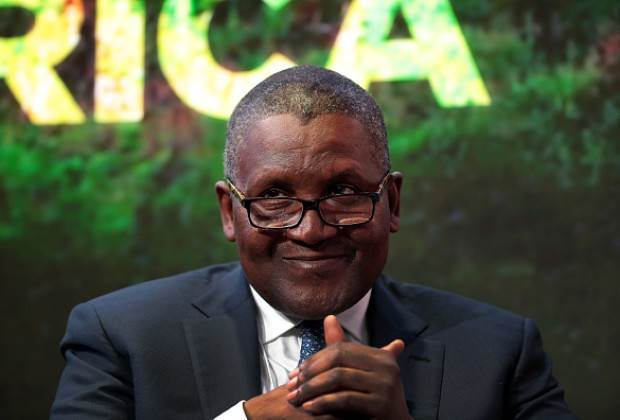Africa’s Richest Man, Aliko Dangote, Doubles His Net Worth to $27.8 Billion After the Launch of His Oil Refinery
Africa’s wealthiest man, Aliko Dangote, has seen his net worth skyrocket, reaching $27.8 billion. Notably, thanks to the successful launch of his highly anticipated oil refinery in Nigeria. This achievement has not only solidified his position as the richest man in Africa but has also propelled him to the 65th spot on the list of the world’s wealthiest individuals, according to the Bloomberg Billionaires Index.
Dangote’s rise to such extraordinary wealth is a testament to his visionary leadership, strategic investments, and business acumen. The recent inauguration of the Dangote Oil Refinery has been a pivotal factor in this growth, marking a major milestone not only for his business empire but also for Nigeria’s economy.
The Significance of the Dangote Oil Refinery
Located in Lagos, Nigeria, the Dangote Oil Refinery is Africa’s largest oil refinery and the world’s largest single-train refinery, capable of processing 650,000 barrels of crude oil per day. The project, which took several years to complete, is expected to be a game-changer for Nigeria’s oil industry and its economy at large. Nigeria, despite being one of the top oil producers in the world, has for decades struggled with refining its own crude oil. Thus, relying heavily on imports to meet domestic demand.
The launch of the refinery has shifted this dynamic, positioning Nigeria as a significant player in the global oil refining industry. It will not only reduce the country’s dependency on imported refined oil products but also increase export capacity, generating much-needed foreign exchange. This massive development, fueled by Dangote’s vision, will potentially stabilize Nigeria’s economy and offer numerous employment opportunities. Hence, further strengthening the country’s economic foundation.
The Economic Impact of the Refinery
The Dangote Oil Refinery is expected to have a far-reaching impact on both Nigeria and the African continent. For Nigeria, the refinery addresses a critical need by reducing the country’s reliance on expensive fuel imports. The country, despite its vast oil reserves, has long been hampered by inadequate refining capacity. By processing crude oil domestically, Nigeria will save billions of dollars on imports. Hence, which can be redirected toward other economic development projects.
Additionally, the refinery is set to become a major exporter of refined petroleum products across Africa, making Nigeria less dependent on foreign markets for fuel. This will enhance Nigeria’s standing in the international oil market while potentially lowering fuel prices across Africa due to increased availability.
The refinery also brings significant job creation potential. With thousands of direct and indirect jobs already created during its construction, the refinery is expected to generate even more employment opportunities now that it is operational. It’s estimated that hundreds of thousands of new jobs will emerge in related industries, further stimulating economic growth in Nigeria and beyond.
A Testament to Dangote’s Business Acumen
Aliko Dangote has long been known for his sharp business instincts and ability to identify opportunities where others might see challenges. From cement to food processing, Dangote’s business empire has expanded across multiple industries, making him a dominant force in African business. His foray into the oil refining sector is perhaps his most ambitious venture yet, demonstrating his commitment to addressing critical infrastructure gaps in Nigeria and Africa.
His wealth, now at $27.8 billion, represents a doubling of his net worth, a testament to the success of his diverse business portfolio, with the refinery playing a key role. While cement remains a cornerstone of his empire, contributing significantly to his fortune, the refinery is set to diversify his revenue streams and further cement his legacy as a transformative business leader in Africa.
Africa’s Richest Man and His Global Standing
With the recent increase in his wealth, Dangote now ranks as the 65th richest man globally, a remarkable feat for an African entrepreneur. His rise to this level of global wealth comes at a time when African billionaires are increasingly gaining international recognition for their contributions to business and society. Dangote’s success story serves as an inspiration not only to African entrepreneurs but also to the global business community.
His ascent to the 65th spot on the Bloomberg Billionaires Index underscores the importance of African markets in the global economy. As more African nations continue to develop and modernize, figures like Dangote are proving that Africa is ripe for business and investment, with vast opportunities waiting to be tapped.
Dangote’s Legacy and the Future of African Business
As Aliko Dangote wealth continues to grow, so does his influence on African business and economic development. He has consistently demonstrated that African entrepreneurs can compete on the global stage and succeed in industries traditionally dominated by foreign companies. His ventures have played a significant role in changing perceptions of Africa’s business landscape. Thus, showing that the continent is home to innovation, resilience, and forward-thinking entrepreneurs.
Dangote’s legacy, cemented by the successful launch of his oil refinery, will undoubtedly shape the future of African business for years to come. His continued investments in infrastructure, agriculture, and manufacturing will inspire the next generation of African entrepreneurs, providing them with a roadmap for success.
In conclusion, Aliko Dangote’s net worth doubling to $27.8 billion following the launch of his refinery marks a major milestone for both the business mogul and Nigeria’s economy. His rise to the 65th richest man in the world is a powerful reminder of the potential that exists in Africa’s markets and the ability of African entrepreneurs to drive economic growth on a global scale.

Leave a Reply